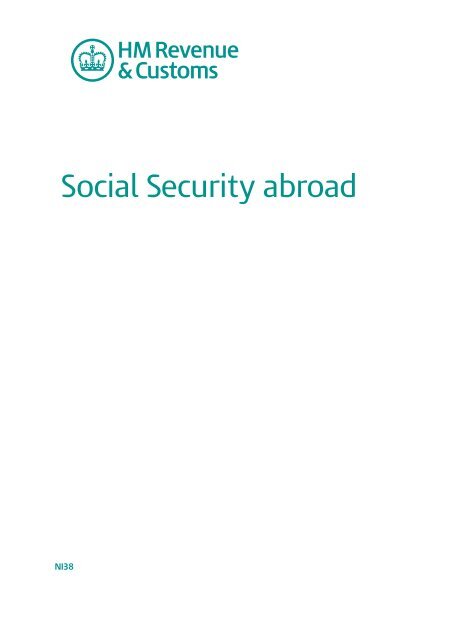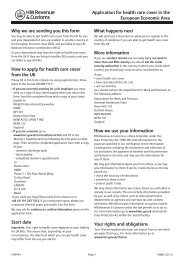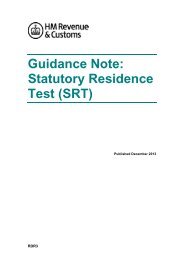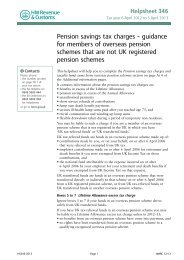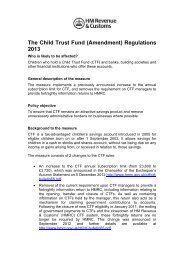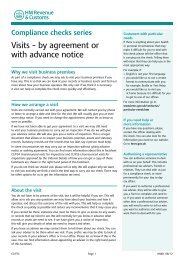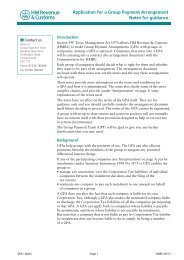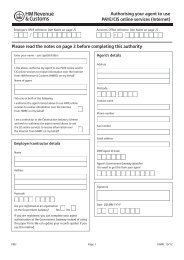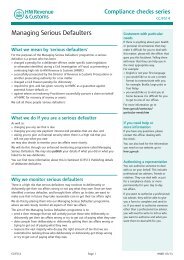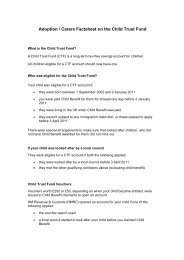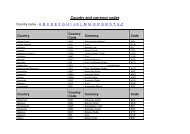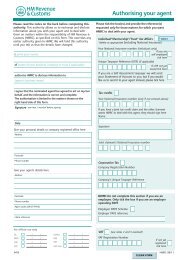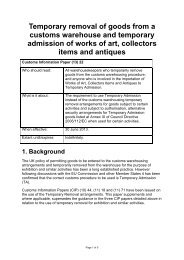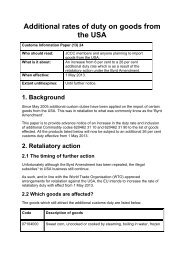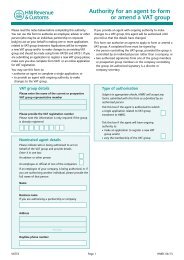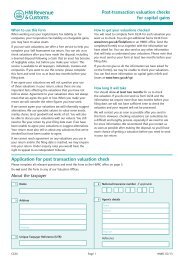NI38 Social Security abroad - HM Revenue & Customs
NI38 Social Security abroad - HM Revenue & Customs
NI38 Social Security abroad - HM Revenue & Customs
Create successful ePaper yourself
Turn your PDF publications into a flip-book with our unique Google optimized e-Paper software.
<strong>Social</strong> <strong>Security</strong> <strong>abroad</strong><br />
<strong>NI38</strong>
Contents<br />
Introduction 1<br />
Information about European<br />
Economic Area and reciprocal<br />
agreement countries 2<br />
European Economic Area (EEA) 2<br />
The EEA countries 2<br />
Reciprocal agreement countries 3<br />
National Insurance contributions<br />
(NICs) 3<br />
Summary of NICs<br />
classes and UK benefits 3<br />
Class 1 4<br />
Class 1A 4<br />
Class 1B 4<br />
Class 2 4<br />
Class 3 4<br />
Class 4 4<br />
How much you pay 5<br />
If you are employed <strong>abroad</strong> 6<br />
When you must pay Class 1 NICs 6<br />
Ordinarily resident 6<br />
Paying voluntary NICs while<br />
you are <strong>abroad</strong> 9<br />
Class 2 NICs 9<br />
Class 3 NICs 10<br />
This leaflet is available<br />
in larger print, Braille<br />
and audio.<br />
Deciding whether to pay<br />
voluntary NICs 11<br />
Special provisions 12<br />
How much do you pay? 12<br />
How to pay voluntary NICs <strong>abroad</strong> 13<br />
Direct Debit 13<br />
The Direct Debit Guarantee 14<br />
Annual payment 14<br />
Payments by an agent 15<br />
Volunteer Development Workers 15<br />
How to pay Volunteer Development<br />
Workers Class 2 NICs <strong>abroad</strong> 15<br />
If you are paying Class 2 or<br />
Class 3 NICs now 16<br />
Other ways of covering your<br />
NI record 16<br />
Credits 16<br />
Home Responsibilities Protection 17<br />
Additional information 18<br />
<strong>Social</strong> security benefits that<br />
depend on your NICs 19<br />
What NICs are needed? 19<br />
Incapacity Benefit 19<br />
Contributionbased<br />
Jobseeker’s Allowance 20<br />
Contributionbased Employment<br />
and Support Allowance 20<br />
Maternity Allowance 20<br />
State Pension 20<br />
How do I get information about my<br />
State Pension entitlement 21<br />
Customers who are widowed or<br />
bereaved civil partners 22
<strong>NI38</strong><br />
Contents (continued)<br />
<strong>Social</strong> <strong>Security</strong> <strong>abroad</strong><br />
Benefits and pensions for<br />
widows, widowers and<br />
surviving civil partners 22<br />
Bereavement benefits 22<br />
War pensions 22<br />
<strong>Social</strong> security benefits that do<br />
not depend on NICs 23<br />
Attendance Allowance 23<br />
Disability Living Allowance 23<br />
Child Benefit 24<br />
Guardian’s Allowance 24<br />
Working Tax Credit 24<br />
Child Tax Credit 24<br />
Incomebased<br />
Jobseeker’s Allowance 24<br />
Incomerelated Employment<br />
and Support Allowance 24<br />
Industrial Injuries<br />
Disablement Benefits 25<br />
Carer’s Allowance 25<br />
Income Support 25<br />
Increase of benefit for<br />
your dependants 26<br />
How to claim benefit when<br />
you are <strong>abroad</strong> 26<br />
Payments based on<br />
employment and earnings 26<br />
Statutory Maternity Pay and<br />
Maternity Allowance 26<br />
Statutory Sick Pay 27<br />
Ordinary Statutory Paternity Pay 27<br />
Additional Statutory Paternity Pay 28<br />
Statutory Adoption Pay 28<br />
Cover for health care 29<br />
Health care when visiting<br />
another EEA country 29<br />
Health care when living, working or<br />
studying in another EEA country 30<br />
Health care when visiting a<br />
nonEEA country 30<br />
Health care when living or<br />
working in a nonEEA country 31<br />
Access to the National<br />
Health Service (NHS) 31<br />
For more information and advice 32<br />
Useful addresses 32<br />
Helplines 33<br />
Welsh language 33<br />
If you are unhappy with<br />
our service 32<br />
How we use your information 33<br />
Special notes and advice for<br />
completion of application<br />
form CF83 34<br />
3
1<br />
If you are going <strong>abroad</strong>, this leaflet will help you<br />
decide if you should pay National Insurance<br />
contributions (NICs) to the United Kingdom (UK)<br />
NI scheme. It also gives details about getting<br />
benefits <strong>abroad</strong>.<br />
Introduction<br />
Some people employed <strong>abroad</strong> have to pay UK NICs. Others may<br />
choose to pay them to help qualify for benefits when they get<br />
back to this country or for State Pension or bereavement benefits<br />
whether they come back or stay <strong>abroad</strong>.<br />
This leaflet describes the classes of NICs, and how paying them<br />
affects your entitlement to social security benefits. It also<br />
describes arrangements for getting health care cover.<br />
This leaflet does not apply to everyone.<br />
If you are:<br />
• going to a European Economic Area (EEA) country or to<br />
a country which has a reciprocal agreement on social<br />
security with the UK, see pages 2 and 3 for how to get<br />
more information<br />
• going to Northern Ireland or the Isle of Man, you don’t need<br />
this leaflet because the social security systems there are linked<br />
to the UK’s and vice versa<br />
• a mariner, a member of the crew of a civil aircraft, a member of<br />
the Armed Forces serving <strong>abroad</strong> or a member of a service<br />
family living <strong>abroad</strong>, then different arrangements apply. For<br />
further information contact <strong>HM</strong> <strong>Revenue</strong> & <strong>Customs</strong> (<strong>HM</strong>RC),<br />
National Insurance Contributions & Employer Office (NIC&EO),<br />
International Caseworker, Newcastle. Their address can be<br />
found on page 32.<br />
<strong>Social</strong>
European Economic<br />
Area (EEA)<br />
The EEA countries<br />
<strong>NI38</strong> <strong>Social</strong> <strong>Security</strong> <strong>abroad</strong><br />
Information about European Economic<br />
Area and reciprocal agreement countries<br />
If you are going to an EEA country you may be covered by the<br />
European Community (EC) social security rules instead of the<br />
rules in this leaflet.<br />
Austria Hungary Portugal<br />
Belgium Iceland Republic of Ireland<br />
Bulgaria Italy Romania<br />
Cyprus Latvia Slovakia<br />
Czech Republic Liechtenstein Slovenia<br />
Denmark Lithuania Spain<br />
Estonia Luxembourg Sweden<br />
Finland Malta Switzerland*<br />
France The Netherlands United Kingdom<br />
(including<br />
Germany Norway<br />
Gibraltar but not<br />
Greece Poland<br />
the Channel<br />
Islands or the Isle<br />
of Man)<br />
*Switzerland is not a member of the EEA but has applied<br />
the European Community regulations on social security<br />
since 1 June 2002.<br />
If you are going to a country covered by the European<br />
Community social security rules, contact, NIC&EO, International<br />
Caseworker, Newcastle at the appropriate address on page 32 for<br />
advice. Say how long you intend to stay and, if you are going to<br />
work, who your employer is.<br />
For further information about the extent of the EC social security<br />
legislation, benefits and health care provision, go to<br />
www.dwp.gov.uk/international<br />
2
Reciprocal<br />
agreement countries<br />
Summary of NICs<br />
classes and UK<br />
benefits<br />
3<br />
<strong>NI38</strong> <strong>Social</strong> <strong>Security</strong> <strong>abroad</strong><br />
The UK has twoway agreements with some other countries<br />
about social security. If you are going to any of the countries<br />
listed, go to www.dwp.gov.uk/international<br />
Barbados<br />
Bermuda<br />
Canada<br />
Israel<br />
Jamaica<br />
Japan*<br />
Jersey and Guernsey<br />
Korea*<br />
Mauritius<br />
New Zealand<br />
Philippines<br />
Turkey<br />
USA<br />
Republics of former Yugoslavia – this means the Republics of<br />
BosniaHerzegovina, Croatia, Macedonia and Serbia<br />
*The Double Contributions Conventions for Japan and the<br />
Republic of Korea only cover social security contribution liability<br />
and do not include benefits.<br />
National Insurance contributions (NICs)<br />
NICs help to pay for some social security benefits, including State<br />
Pension. There are six classes of NICs. The class you pay in the UK<br />
depends on whether you are employed, selfemployed or can pay<br />
voluntary NICs.
<strong>NI38</strong> <strong>Social</strong> <strong>Security</strong> <strong>abroad</strong><br />
Class 1 You must pay these if you work for an employer and your earnings<br />
are at, or above, the Primary Threshold (sometimes referred to as the<br />
Earnings Threshold). The amount you pay depends on what you earn,<br />
(up to the maximum NICs an employee can pay). Your NICs are<br />
deducted from your wages. Your employer also has to pay NICs for all<br />
employees who earn at, or above, the Primary Threshold.<br />
Class 1A These contributions are paid only by employers who provide<br />
employees with certain benefits in kind for private use, for example,<br />
cars and fuel.<br />
Class 1B These contributions are paid only by employers who enter into a<br />
Pay as You Earn (PAYE) Settlement Agreement with <strong>HM</strong>RC for tax.<br />
Class 2 Subject to certain exceptions, these contributions have to be paid in<br />
respect of each week in which you are selfemployed. You pay the<br />
same amount however much you earn. In the UK, you can pay these<br />
NICs by Direct Debit deducted from your UK or Channel Islands bank<br />
or building society account.<br />
Class 3 These are voluntary contributions and can be paid if you want to<br />
protect your right to some social security benefits and you are not<br />
liable to pay Class 1 or Class 2 NICs. You pay them like Class 2 NICs, or<br />
as a lump sum at the end of the tax year. Although the payment of<br />
Class 3 NICs is voluntary, they cannot be automatically refunded to<br />
you at a later date.<br />
Class 4 Class 4 NICs are for selfemployed people whose net profits are over a<br />
certain amount. These are normally paid by selfemployed people in<br />
addition to Class 2 NICs. They are collected with Income Tax, and don’t<br />
count towards benefits.<br />
4
<strong>NI38</strong> <strong>Social</strong> <strong>Security</strong> <strong>abroad</strong><br />
How much you pay The amounts charged normally change at the beginning of<br />
each tax year (6 April). Go to www.hmrc.gov.uk/rates/nic.htm<br />
5<br />
for details.<br />
The class of NICs you pay affects the benefits you can get. The<br />
following table shows which NICs count for which benefit.<br />
Benefit Class 1 Class 2 Class 3<br />
Contributionbased<br />
Jobseeker’s Allowance Yes No No<br />
Contributionbased<br />
Employment and<br />
Support Allowance Yes Yes No<br />
Incapacity Benefit Yes Yes No<br />
Bereavement benefits Yes Yes Yes<br />
Basic State Pension Yes Yes Yes<br />
Additional State Pension Yes No No<br />
Other benefits are noncontributory. This means that you don’t<br />
have to pay any NICs to get them, but you must meet the rules<br />
that apply to them. For details of noncontributory benefits, see<br />
pages 23 to 25.<br />
Some payments are based on your employment and earnings.<br />
These are Statutory Maternity Pay and Maternity Allowance,<br />
Statutory Sick Pay, Ordinary or Additional Statutory Paternity Pay<br />
and Statutory Adoption Pay. You have to meet the conditions that<br />
apply to them, see pages 26 to 29. If you and your employer are<br />
liable to pay NICs on your earnings whilst you are working <strong>abroad</strong><br />
you may be able to get Statutory Maternity Pay , Statutory Sick<br />
Pay, Ordinary or Additional Statutory Paternity Pay and Statutory<br />
Adoption Pay from your employer. If you cannot get Statutory<br />
Maternity Pay but have paid Class 1 NICs <strong>abroad</strong> these may help<br />
you to get Maternity Allowance on your return to the UK.<br />
From April 2000, benefits for widows, widowers and, from<br />
December 2005, surviving civil partners are dependent on your<br />
late spouse’s or civil partner’s Class 1, 2 or 3 NICs.<br />
Basic State Pension can also be based partly or wholly on your<br />
husband’s NI record if this increases the value of your entitlement.
When you must<br />
pay Class 1 NICs<br />
<strong>NI38</strong> <strong>Social</strong> <strong>Security</strong> <strong>abroad</strong><br />
From 6 April 2010 a married man’s or civil partner’s basic State<br />
Pension can be based partly or wholly on the NI record of their<br />
wife or civil partner if they have both reached State Pension age<br />
and their wife or civil partner was born on or after 6 April 1950<br />
and is entitled to basic State Pension.<br />
If you are divorced or have had your civil partnership dissolved and<br />
have not married again or formed a new civil partnership, you may<br />
be able to claim benefits based on your former spouse’s or civil<br />
partner’s NICs.<br />
If you are employed <strong>abroad</strong><br />
When you are employed <strong>abroad</strong> Class 1 NICs must be paid for the<br />
first 52 weeks you are there, if you meet the following conditions:<br />
• your employer has a place of business in the UK, and<br />
• you are ‘ordinarily resident’ in the UK (see below), and<br />
• immediately before starting the employment <strong>abroad</strong> you were<br />
resident in the UK.<br />
Ordinarily resident<br />
You are ordinarily resident in a particular country if you:<br />
• normally live there, apart from temporary or occasional<br />
absences, and<br />
• have a settled and regular mode of life there.<br />
When you tell us your ‘ordinary resident’ status you must base this<br />
on your circumstances at the time you left the UK. This is<br />
important as it will help you to work out your correct National<br />
Insurance insurability position for your period <strong>abroad</strong>.<br />
Being ordinarily resident in the UK for National Insurance purposes<br />
is different to being resident in the UK for Income Tax purposes.<br />
It does not follow that:<br />
• if you are nonresident in the UK for Income Tax purposes that<br />
you will also be not ordinarily resident in the UK for National<br />
Insurance purposes, or<br />
• if you are ordinarily resident in the UK for National Insurance<br />
purposes that you will also be resident in the UK for<br />
Income Tax purposes.<br />
6
<strong>NI38</strong> <strong>Social</strong> <strong>Security</strong> <strong>abroad</strong><br />
You may be ordinarily resident in:<br />
• a place from which you are temporarily absent, or<br />
• two places at once, in some circumstances.<br />
When you go <strong>abroad</strong>, there are a number of factors which are considered in deciding<br />
whether or not you are ordinarily resident in the UK. For example:<br />
7<br />
Factor Indication that you are<br />
You return to the UK from time to time<br />
during the period of employment <strong>abroad</strong>.<br />
Visits to your family who have remained at<br />
your home in the UK, or holidays spent at<br />
your home in the UK.<br />
Visits in connection with the overseas<br />
work, for example, for briefing or training<br />
or to make a report.<br />
Partner and/or children are with you<br />
during your overseas employment.<br />
You maintain a home in the UK during<br />
your absence.<br />
Your home in the UK is available for your<br />
use on your return.<br />
You have lived in the UK for a<br />
substantial period.<br />
You will return to the UK at the end of your<br />
employment <strong>abroad</strong>.<br />
Ordinarily resident in the UK. The more<br />
frequent and the longer the returns, the<br />
stronger the indication that you are<br />
ordinarily resident in the UK.<br />
Ordinarily resident in the UK.<br />
Not such a strong indication that you are<br />
ordinarily resident in the UK.<br />
Not ordinarily resident in the UK, especially<br />
if you do not retain a home in the UK or<br />
only make occasional visits to the UK.<br />
Ordinarily resident in the UK.<br />
Ordinarily resident in the UK, but if your<br />
house has been rented on a long let it is<br />
not a strong indication of being<br />
ordinarily resident.<br />
The longer the period, the stronger the<br />
indication that you are ordinarily resident<br />
in the UK despite the period of<br />
employment <strong>abroad</strong>.<br />
The earlier the return, the stronger the<br />
indication that you are ordinarily resident<br />
in the UK.
<strong>NI38</strong> <strong>Social</strong> <strong>Security</strong> <strong>abroad</strong><br />
<strong>HM</strong> <strong>Revenue</strong> & <strong>Customs</strong> (<strong>HM</strong>RC), NIC&EO, International<br />
Caseworker, Newcastle will consider the circumstances of<br />
individual cases. If you have any doubts about whether you are<br />
ordinarily resident or not contact them at the address shown on<br />
page 32, giving as much information as possible based on the<br />
guidelines on pages 6 and 7.<br />
Class 1 NICs are payable by you and your employer just as if you<br />
were employed in the UK. The rates are the same and your<br />
employer will deduct your contribution from your salary and pay<br />
it to <strong>HM</strong>RC on your behalf.<br />
If your employer is an overseas government or an international<br />
organisation such as the United Nations High Commissioner for<br />
Refugees (UNHCR), they might not pay the employer’s share of<br />
the Class 1 NICs because of their legal position in this country.<br />
If this is the case, you become liable to pay your own Class 1 NICs.<br />
If you don’t pay these Class 1 NICs for the first 52 weeks of your<br />
employment <strong>abroad</strong>, you cannot pay Class 2 or Class 3 NICs<br />
instead. This means there will be a gap in your insurance record,<br />
which could affect your entitlement to any of the benefits listed<br />
in the table on page 5.<br />
Payment of Class 1 NICs during your first 52 weeks <strong>abroad</strong> can<br />
help you to satisfy the conditions for contributionbased<br />
Jobseeker’s Allowance, contributionbased Employment and<br />
Support Allowance, Incapacity Benefit or Maternity Allowance on<br />
your return to the UK.<br />
If you are in any doubt about the status of your employer or<br />
require information on how to pay your share of Class 1 NICs,<br />
write to <strong>HM</strong>RC, NIC&EO, International Caseworker, Newcastle at<br />
the address shown on page 32.<br />
After the first 52 weeks you may wish to pay either Class 2 or<br />
Class 3 NICs on a voluntary basis to protect your entitlement to<br />
State Pension and bereavement benefits. Although these benefits<br />
are payable anywhere <strong>abroad</strong>, they are not normally increased<br />
when pension rates go up in the UK.<br />
8
Class 2 NICs<br />
9<br />
<strong>NI38</strong> <strong>Social</strong> <strong>Security</strong> <strong>abroad</strong><br />
Paying voluntary NICs while you<br />
are <strong>abroad</strong><br />
You may choose to pay Class 2 NICs to help you qualify for<br />
contributionbased Employment and Support Allowance and<br />
Incapacity Benefit when you get back to the UK, as well as State<br />
Pension and bereavement benefits.<br />
You can pay Class 2 NICs if you are employed or selfemployed<br />
<strong>abroad</strong> and if you satisfy the following conditions:<br />
• you have lived in the UK for a continuous threeyear period at<br />
any time before the period for which NICs are to be paid. (If you<br />
have lived or worked in another EEA country or in Turkey, time<br />
spent there may help you to meet this condition), or<br />
• before going <strong>abroad</strong> you paid a set amount in NICs for three<br />
years or more (this will be checked when you ask to pay Class 2<br />
NICs), and<br />
• immediately before going <strong>abroad</strong> you were ordinarily an<br />
employed or selfemployed earner or registered unemployed<br />
in the UK.<br />
You cannot pay Class 2 NICs for any period during which you are<br />
liable to pay Class 1 NICs.<br />
If you want to apply to pay Class 2 NICs while you are <strong>abroad</strong>, fill<br />
in and return the application form CF83 at the back of this leaflet<br />
and on a separate sheet of paper include details of<br />
• your employment(s),<br />
• selfemployment(s),<br />
• periods of registered unemployment<br />
during the past three years and tell us the date you:<br />
• gave up work, or<br />
• will give up work,<br />
before going <strong>abroad</strong>.<br />
Please also tell us when you intend to start, or have started work<br />
<strong>abroad</strong> and, if possible, supply documentary evidence to support<br />
your employment position <strong>abroad</strong>.<br />
If you are liable for Class 1 NICs please don’t apply to pay Class 2<br />
NICs until your liability for Class 1 NICs has ended.
Class 3 NICs<br />
<strong>NI38</strong> <strong>Social</strong> <strong>Security</strong> <strong>abroad</strong><br />
Voluntary payment of Class 2 NICs does not give cover for health<br />
care <strong>abroad</strong> in any circumstances.<br />
Voluntary contributions correctly paid at one rate cannot<br />
later be converted to another rate simply because the other rate<br />
is cheaper.<br />
You can pay voluntary Class 3 NICs to protect your right to<br />
State Pension and, if you are married or in a civil partnership,<br />
your spouse’s or surviving civil partner’s right to bereavement<br />
benefits. Although these benefits are payable anywhere <strong>abroad</strong>,<br />
they are not normally increased when pension rates go up in the<br />
UK. In addition, these contributions do not count towards<br />
contributionbased Employment and Support Allowance,<br />
Incapacity Benefit or Maternity Allowance.<br />
You can pay Class 3 NICs whether you are working <strong>abroad</strong> or not,<br />
but not for the period you are liable to pay Class 1 NICs.<br />
You can pay Class 3 NICs <strong>abroad</strong>:<br />
• if you have paid Class 1 NICs for the first 52 weeks of your<br />
employment <strong>abroad</strong>, or<br />
• you satisfy either of the following conditions<br />
— you have lived in the UK for a continuous threeyear period<br />
at any time before the period for which NICs are to be paid.<br />
(If you have lived or worked in another EEA country or in<br />
Turkey, time spent there might help you to meet this<br />
condition), or<br />
— before you went <strong>abroad</strong>, you paid a set amount in NICs for<br />
three years or more (this will be checked when you ask to<br />
pay Class 3 NICs).<br />
If you want to apply to pay Class 3 NICs while you are <strong>abroad</strong>, fill<br />
in and return the application form CF83 at the back of this leaflet.<br />
If you are liable for Class 1 NICs please don’t apply to pay<br />
voluntary Class 3 NICs until your liability for Class 1 NICs<br />
has ended.<br />
Voluntary payment of Class 3 NICs does not give cover for health<br />
care <strong>abroad</strong> in any circumstances.<br />
10
11<br />
<strong>NI38</strong> <strong>Social</strong> <strong>Security</strong> <strong>abroad</strong><br />
Voluntary NICs correctly paid at one rate cannot be later<br />
converted to another rate simply because the other rate<br />
is cheaper.<br />
Deciding whether to pay voluntary NICs<br />
You can generally choose to pay Class 2 or Class 3 NICs while<br />
<strong>abroad</strong> if you wish to protect your entitlement to some social<br />
security benefits.<br />
There are some points to bear in mind when deciding what NICs<br />
you wish to pay.<br />
For entitlement to benefits you must pay 52 voluntary NICs for<br />
every tax year for which you choose to pay. Paying less will not<br />
give you a qualifying year. If you have paid Class 1 NICs, or<br />
received credits for any part of a tax year, the number of Class 2<br />
or Class 3 NICs you may need to pay can only be calculated after<br />
the end of that tax year, and after the Class 1 NICs or credits have<br />
been recorded on your National Insurance account. A notice of<br />
any deficiency in your NICs record may be issued some 18 months<br />
after the end of the tax year to your last recorded address. It will<br />
tell you how many voluntary contributions you will need to pay<br />
to make that year a qualifying year.<br />
It could be in your own interest to ask for a statement of your<br />
NICs for the year you left the UK. (See page 12 for the time limits<br />
and penalties for late payment.)<br />
If you are entitled to pay both Class 2 and Class 3 NICs, you can<br />
change from one to the other as you choose by filling in form<br />
CF83. But you cannot change from Class 3 to Class 2 NICs if you<br />
are not working.<br />
Class 2 contributions can help you satisfy the conditions to<br />
qualify for contributionbased Employment and Support<br />
Allowance and Incapacity Benefit when you return to the UK.<br />
They will also help protect your entitlement to State Pension and<br />
bereavement benefits which can be paid anywhere <strong>abroad</strong>.
Special provisions<br />
How much do<br />
you pay?<br />
<strong>NI38</strong> <strong>Social</strong> <strong>Security</strong> <strong>abroad</strong><br />
It is important to note that Class 2 NICs should be paid by the due<br />
date of 31 January and 31 July each year. Class 3 NICs should be<br />
paid by the due date which is within 42 days of the end of the tax<br />
year they cover. Late payments may affect your right to benefits.<br />
There are also time limits for payment and financial penalties for<br />
late payment.<br />
If Class 2 NICs are not paid before the end of the tax year<br />
following the year in which they are due, they must be paid at the<br />
highest Class 2 rate in force between the weeks when they were<br />
due and the date when they are paid. For example Class 2 NICs<br />
for the 2010–11 tax year must be paid by 5 April 2012, otherwise<br />
the amount you have to pay may increase. The later you pay the<br />
NICs, the more you might have to pay.<br />
If Class 3 NICs are not paid until after the end of the second tax<br />
year following the one in which they were due, they must be paid<br />
at the highest Class 3 rate in force between the weeks for which<br />
they should be paid and the date they are paid. For example Class 3<br />
NICs for the 2010–11 tax year must be paid by 5 April 2013,<br />
otherwise the amount you have to pay may increase. The later<br />
you pay the NICs, the more you might have to pay.<br />
Payment of Class 2 or Class 3 NICs can’t normally be made after the<br />
end of the sixth tax year following the one in which they were due.<br />
Special provisions apply if you reach UK State Pension age<br />
between 6 April 2008 and 5 April 2015 and are not expecting to<br />
receive a full UK basic State Pension. If these circumstances apply<br />
to you, and if you meet certain other conditions, you may be able<br />
to improve your basic State Pension by paying up to six extra<br />
years of Class 3 NICs for years going back to 1975.<br />
For more information go to www.hmrc.gov.uk/individuals or<br />
www.direct.gov.uk<br />
These special provisions don’t apply to voluntary Class 2 NICs.<br />
The UK NICs rates are the same <strong>abroad</strong> as in the UK. For more<br />
information on NICs rates go to www.hmrc.gov.uk/rates/nic.htm<br />
12
Direct Debit<br />
13<br />
<strong>NI38</strong> <strong>Social</strong> <strong>Security</strong> <strong>abroad</strong><br />
How to pay voluntary NICs <strong>abroad</strong><br />
You can choose how to pay Class 2 or Class 3 NICs. This method<br />
allows you to pay NICs directly from your UK or Channel Islands<br />
bank or building society account.<br />
Class 2 NICs – monthly payments will be collected monthly, four<br />
months in arrears. Each payment will cover either four or five<br />
weeks, depending on the number of Sundays in the month the<br />
payment is due for.<br />
Class 2 NICs – sixmonthly payments will cover 26 or 27 weeks<br />
depending on the number of Sundays in the sixmonth period the<br />
payment is due for. Collections will be made in January and July<br />
each year.<br />
Class 3 NICs – payments will continue to be collected monthly in<br />
arrears. Each payment will cover either four or five weeks,<br />
depending on the number of Sundays in the month the payment<br />
is due for.<br />
All payments will be collected on or up to three working days<br />
after the second Friday of each month except when bank holidays<br />
cause a change in this arrangement. Please make sure you have<br />
enough funds in your account.<br />
The arrangement normally begins after <strong>HM</strong>RC receives a request<br />
from you to pay by Direct Debit and continues until you tell your<br />
bank or building society to cancel it. We will not collect NICs for<br />
any weeks beyond State Pension age but remember your NICs are<br />
collected in arrears when cancelling your Direct Debit.<br />
If the NICs rate changes (which usually happens every April) the<br />
new amount will be debited from your account. <strong>HM</strong>RC will tell<br />
you of the change in the amount to be collected.<br />
If you wish to pay in this way, tick the box on form CF83 at the<br />
back of this leaflet, fill in the Direct Debit Instruction (at the<br />
bottom of form CF83) and return it to <strong>HM</strong>RC, International<br />
Caseworker, Residency, Newcastle at the address on page 32
<strong>NI38</strong> <strong>Social</strong> <strong>Security</strong> <strong>abroad</strong><br />
The Direct Debit Guarantee<br />
• This Guarantee is offered by all banks and building societies that<br />
accept instructions to pay Direct Debits<br />
• If there are any changes to the amount, date or frequency of your Direct Debit<br />
<strong>HM</strong> <strong>Revenue</strong> & <strong>Customs</strong> will notify you 10 working days in advance of your account<br />
being debited or as otherwise agreed. If you request <strong>HM</strong> <strong>Revenue</strong> & <strong>Customs</strong><br />
to collect a payment, confirmation of the amount and date will be given to you<br />
at the time of the request<br />
• If an error is made in the payment of your Direct Debit, by <strong>HM</strong> <strong>Revenue</strong> & <strong>Customs</strong><br />
or your bank or building society you are entitled to a full and immediate refund<br />
of the amount paid from your bank or building society<br />
— If you receive a refund you are not entitled to, you must pay it back when<br />
<strong>HM</strong> <strong>Revenue</strong> & <strong>Customs</strong> asks you to<br />
• You can cancel a Direct Debit at any time by simply contacting your bank<br />
or building society. Written confirmation may be required. Please also notify us.<br />
Annual payment<br />
If you wish to have the arrears for the current tax year deducted<br />
by Direct Debit please put a tick in the appropriate box on form<br />
CF83 attached to the back of this leaflet.<br />
Alternatively, if you wish to pay the arrears for the current tax<br />
year by sterling cheque, please tick the appropriate box on the<br />
CF83 and we will write to you with details of the amount needed<br />
after we have received your application.<br />
Please make sure you have sufficient funds in your bank or<br />
building society account to cover the amount to be collected.<br />
Note: banks and building societies may not accept Direct Debit<br />
instructions for some types of account.<br />
This allows you to pay NICs for a complete tax year, once a year in<br />
arrears, direct to <strong>HM</strong>RC, NIC&EO, International Caseworker,<br />
NEWCASTLE UPON TYNE, NE98 1ZZ. If you want to pay by this<br />
method tick the appropriate box on form CF83 at the back of this<br />
leaflet. You will be told each year how much you should pay in<br />
sterling and when payment is due. You can pay direct or through<br />
your bank or building society.<br />
14
Payments by<br />
an agent<br />
How to pay<br />
Volunteer<br />
Development<br />
Workers Class 2<br />
NICs <strong>abroad</strong><br />
15<br />
<strong>NI38</strong> <strong>Social</strong> <strong>Security</strong> <strong>abroad</strong><br />
You can get someone in the UK to pay your NICs for you. If you<br />
wish to do this, tick the appropriate box on form CF83 at the<br />
back of this leaflet and give your agent’s name and address.<br />
Your agent can pay your NICs by Direct Debit or annual payment.<br />
Ask your agent to wait until they receive a letter from <strong>HM</strong>RC,<br />
NIC&EO, International Caseworker, Newcastle before paying<br />
your NICs.<br />
Volunteer Development Workers<br />
If you are sent to work <strong>abroad</strong> in a developing country by a<br />
registered charity, you may be able to choose to pay the special<br />
Volunteer Development Workers Class 2 NICs. These NICs may<br />
help you satisfy the conditions for contribution–based Jobseeker’s<br />
Allowance, contribution–based Employment and Support<br />
Allowance, Incapacity Benefit and Maternity Allowance and give<br />
you cover for industrial injury or disablement suffered during<br />
your employment <strong>abroad</strong> when you return to the UK.<br />
You may pay Volunteer Development Workers Class 2 NICs if:<br />
• you are ‘ordinarily resident’ in the UK (see pages 6 and 7 for<br />
what this means), and<br />
• your recruiting organisation is approved for these purposes by<br />
<strong>HM</strong> <strong>Revenue</strong> & <strong>Customs</strong> Executive Committee, and<br />
• the country where you are working is recognised as a developing<br />
country by <strong>HM</strong> <strong>Revenue</strong> & <strong>Customs</strong> Executive Committee.<br />
The organisation that recruited you will know whether the last<br />
two conditions are satisfied.<br />
Fill in form CF83 at the back of this leaflet and send it to your<br />
recruiting organisation who will act as your agent in paying<br />
your NICs.
Credits<br />
<strong>NI38</strong> <strong>Social</strong> <strong>Security</strong> <strong>abroad</strong><br />
If you are paying Class 2 or Class 3<br />
NICs now<br />
If you have been paying Class 2 or Class 3 NICs by Direct Debit,<br />
sixmonthly payment request or quarterly bill and you are not<br />
going to pay Class 2 or Class 3 NICs whilst <strong>abroad</strong>, write to:<br />
<strong>HM</strong>RC<br />
National Insurance Contributions & Employer Office<br />
SelfEmployment Services Customer Accounts Section<br />
Benton Park View<br />
NEWCASTLE UPON TYNE<br />
NE98 1ZZ<br />
If appropriate, tell them when your selfemployment ended, what<br />
date you are going <strong>abroad</strong> and your overseas address.<br />
If you want to pay Class 2 or Class 3 NICs while you are <strong>abroad</strong>, fill<br />
in and return the application form CF83 at the back of this leaflet.<br />
Other ways of covering your NI record<br />
There are two other ways in which your NI record can<br />
be maintained.<br />
Whilst in the UK you may be able to get credits instead of having<br />
to pay NICs if you are:<br />
• unemployed or unable to work because of illness or disability<br />
for full weeks (a week for these purposes means Sunday to<br />
Saturday). You will normally have to attend an interview every<br />
two weeks at your nearest Jobcentre Plus office (<strong>Social</strong> <strong>Security</strong><br />
or Jobs and Benefits Office in Northern Ireland), or send in sick<br />
notes (also known as medical certificates) to your nearest<br />
Jobcentre to get the credits. In Northern Ireland you should<br />
send sick notes to the Incapacity Benefits Branch, Castle Court,<br />
Royal Avenue, Belfast, BT1 1SB<br />
• entitled to Maternity Allowance or Carer’s Allowance<br />
• entitled to Statutory Sick Pay, Statutory Maternity Pay or<br />
Statutory Adoption Pay<br />
• taking a course of approved training<br />
16
Home<br />
Responsibilities<br />
Protection<br />
17<br />
<strong>NI38</strong> <strong>Social</strong> <strong>Security</strong> <strong>abroad</strong><br />
• receiving Working Tax Credit<br />
• required to attend jury service and did not have earnings<br />
at, or exceeding, the Lower Earnings Limit for employed<br />
earners employment<br />
• receiving a compensatory payment such as a Payment in Lieu of<br />
Notice (PILON), or a Payment in Lieu of Remuneration (PILOR)<br />
• a person who served a prison sentence for a conviction which<br />
has been quashed<br />
• a man aged 60 or over (credits can be awarded automatically),<br />
but this will not apply to any tax year during which you are<br />
<strong>abroad</strong> for more than 182 days. These credits are being phased<br />
out and will no longer be available after 2018<br />
• a young person, for the tax year in which you reach age 16 and<br />
the two following years.<br />
Men who plan to go, or have been, <strong>abroad</strong> for more than 182<br />
days in a tax year can claim contributionbased Jobseeker’s<br />
Allowance (if they are out of work) or contributionbased<br />
Employment and Support Allowance, or Incapacity Benefit (if they<br />
are incapable of work through illness) to enable them to get<br />
credits for that part of the tax year spent in the UK. They can also<br />
pay voluntary NICs for the period they were <strong>abroad</strong> if they want<br />
that tax year to count for State Pension purposes.<br />
If you get contributionbased Employment and Support<br />
Allowance, Incapacity Benefit or Carer’s Allowance from the UK<br />
while you are <strong>abroad</strong>, you may be awarded credits instead of<br />
paying NICs.<br />
If your opportunity to work is limited because you are looking<br />
after a child (including as a registered foster carer) or a sick or<br />
disabled person, Home Responsibilities Protection can make it<br />
easier to get a basic State Pension. See form CF411 Application<br />
for Home Responsibilities Protection (HRP).<br />
Home Responsibilities Protection will be available to you <strong>abroad</strong><br />
if you continue to be entitled to UK Child Benefit.<br />
From 6 April 2010 Home Responsibilities Protection was replaced<br />
by weekly National Insurance credits for people getting Child<br />
Benefit for a child under 12, foster carers and people caring for at<br />
least 20 hours a week for one (or more) sick or severely disabled<br />
person.
<strong>NI38</strong> <strong>Social</strong> <strong>Security</strong> <strong>abroad</strong><br />
Additional information<br />
If you marry while you are <strong>abroad</strong> and you have been paying any<br />
class of NICs, write to <strong>HM</strong>RC, NIC&EO, International Caseworker,<br />
Newcastle. The address can be found on page 32. Give the date<br />
you married and your own NI number and that of your spouse. If<br />
you are a woman, please also give your new and former name<br />
and the name and title by which you wish to be addressed in the<br />
future. We will change our records accordingly.<br />
If you are a married woman, you may be able to use the NI record<br />
of your husband to increase your basic State Pension if your own<br />
record is not good enough. From April 2010 a married man’s or<br />
civil partner’s basic State Pension can be based partly or wholly<br />
on the NI record of their wife or civil partner if they have both<br />
reached State Pension age and their wife or civil partner was born<br />
on or after 6 April 1950 and is entitled to basic State Pension.<br />
For further information on all State Pension issues see leaflet<br />
PM2 State Pensions – your guide, or go to<br />
www.dwp.gov.uk/publications<br />
Some married women and widows pay reduced rate NICs because<br />
in the past they made a married woman’s reduced rate election<br />
(that is, they chose to pay Class 1 NICs at a reduced rate or not to<br />
pay Class 2 NICs if selfemployed). All the time that election is in<br />
force, they cannot pay Class 3 NICs, claim credits (unless they are<br />
a widow) or get Home Responsibilities Protection, or claim the<br />
benefits listed on page 5. This election ends when a woman is<br />
divorced or stops being a qualifying widow or lapses<br />
automatically where someone is not earning enough to pay NICs<br />
and is not selfemployed for two complete tax years. However, a<br />
woman can also choose to revoke her married woman’s election.<br />
The same rules apply <strong>abroad</strong> as in the UK. Go to<br />
www.hmrc.gov.uk/ni/reducedrate/marriedwomen.htm<br />
18
What NICs are<br />
needed?<br />
Incapacity Benefit<br />
19<br />
<strong>NI38</strong> <strong>Social</strong> <strong>Security</strong> <strong>abroad</strong><br />
<strong>Social</strong> security benefits that depend on<br />
your NICs<br />
There are several rules governing social security benefits. These<br />
are explained in a series of leaflets on individual benefits. You<br />
should read the leaflet on the benefit you are interested in. They<br />
are available on the Department for Work and Pensions website.<br />
Go to www.dwp.gov.uk/publications<br />
To qualify for most of the benefits mentioned in this section,<br />
you need to have NICs on your NI record during the ‘relevant<br />
tax years’.<br />
The relevant tax years are normally the last two complete tax<br />
years before the calendar year in which you claim benefit. For<br />
example, if you claim benefit in October 2008, the relevant tax<br />
years would be 6 April 2005 to 5 April 2006 and 6 April 2006 to<br />
5 April 2007. The relevant tax years for basic State Pension and<br />
bereavement benefits are different.<br />
Because Class 1 NICs are based on earnings, you cannot just count<br />
the number of weeks you have paid. NICs rules are based on the<br />
number of weeks NICs you would need to pay if your weekly<br />
earnings were at the Lower Earnings Limit during the tax year. If<br />
your earnings are normally above the Lower Earnings Limit, you<br />
will need to have paid fewer weeks NICs to have reached the<br />
right amount.<br />
For the following benefits, we detail the amounts and type of<br />
NICs you need to have paid. This should help you decide if you<br />
need to pay voluntary NICs while you are away. We also give<br />
details about getting the benefits <strong>abroad</strong> and the rules when you<br />
return to the UK.<br />
Incapacity Benefit (IB) gives working age people a replacement<br />
income when they become sick or disabled and stop working or<br />
looking for work as a result. It can be paid based on the number<br />
of NICs they have paid or been credited. Or if they were sick or<br />
disabled when they were 16 or over but under 20 (25 if they were<br />
in education or training before age 20) they may be able to claim<br />
under the youth provisions. If you get IB and you are planning to<br />
go <strong>abroad</strong>, you must tell your Jobcentre Plus office immediately
Contributionbased<br />
Jobseeker’s<br />
Allowance<br />
Contributionbased<br />
Employment and<br />
Support Allowance<br />
Maternity<br />
Allowance<br />
State Pension<br />
<strong>NI38</strong> <strong>Social</strong> <strong>Security</strong> <strong>abroad</strong><br />
to check if your benefit is affected. For more information about<br />
IB contact your nearest Jobcentre Plus office or go to<br />
www.direct.gov.uk<br />
For more information on contributionbased Jobseeker’s<br />
Allowance ask at your nearest Jobcentre Plus office (in Northern<br />
Ireland, your nearest <strong>Social</strong> <strong>Security</strong> or Jobs and Benefits Office).<br />
For more information go to www.direct.gov.uk<br />
Contributionbased Employment and Support Allowance (ESA) is a<br />
social security benefit for people who have an illness or disability.<br />
You may be able to get ESA if you have an illness or disability, and<br />
you are unemployed, or you are selfemployed, or you work for<br />
an employer but you cannot get Statutory Sick Pay (SSP), or you<br />
have been getting SSP but it has now stopped. If you get<br />
contributionbased ESA and are planning to go <strong>abroad</strong>, you must<br />
contact Jobcentre Plus (in Northern Ireland customers should<br />
contact the ESA Centre, James House, Cromac Avenue, Belfast)<br />
immediately to check if your benefit is affected.<br />
Maternity Allowance (MA) is principally based on your<br />
employment and earnings (see page 26) but payments of<br />
Class 1 NICs <strong>abroad</strong> can help you qualify for MA on your<br />
return to the UK. For information about Volunteer Development<br />
Workers and Class 2 NICs see page 15.<br />
If you move <strong>abroad</strong> to work before you reach State Pension age,<br />
you might not build up entitlement to a State Pension (the<br />
basic State Pension and any additional State Pension) for those<br />
years. However, this depends on your particular circumstances<br />
(for example, whether it is a UK company you work for or a<br />
foreign company).<br />
If you go to live <strong>abroad</strong> permanently, you will not get a yearly<br />
increase in your State Pension (including your additional State<br />
Pension) unless you live in an EEA country (including Switzerland),<br />
or a country with which the UK has a reciprocal agreement that<br />
allows for these increases (known as ‘upratings’). For more<br />
information on which countries these are, and how UK State<br />
Pension is paid to people <strong>abroad</strong>, go to www.direct.gov.uk<br />
20
How do I get<br />
information about<br />
my State Pension<br />
entitlement?<br />
21<br />
<strong>NI38</strong> <strong>Social</strong> <strong>Security</strong> <strong>abroad</strong><br />
If you have just come to the UK, or are returning to the UK after a<br />
period <strong>abroad</strong>, the rules for some benefits are different, even if<br />
you are a UK national. To find out more go to www.direct.gov.uk<br />
If you plan to live <strong>abroad</strong> when you retire, the pension you get<br />
from an occupational scheme will increase each year in line with<br />
the scheme rules and current legislation.<br />
You can find out how much State Pension you have accrued to<br />
date. This could help you to decide whether you are saving<br />
enough money to cover your retirement and if you need to<br />
save more.<br />
There are three ways you can get information about your<br />
State Pension entitlement.<br />
• Online, go to www.direct.gov.uk/pensionforecast and follow<br />
the State Pension forecasting links.<br />
• Phone the Future Pension Centre on 0845 3000 168. They will<br />
take your application over the phone. If you use a textphone,<br />
phone 0845 300 0169.<br />
• Use application form BR19. Fill it in and send it to:<br />
Future Pension Centre, The Pension Service, Tyneview Park,<br />
Whitley Road, NEWCASTLE UPON TYNE, NE98 1BA.<br />
If you live outside the UK there are two ways you can get<br />
information about your State Pension entitlement.<br />
• Phone the Future Pension Centre on<br />
+44 191 218 3600. For security and quality purposes your call<br />
may be monitored and recorded.<br />
• Use application form BR19. Fill it in and send it to:<br />
Future Pension Centre, The Pension Service, Tyneview Park,<br />
Whitley Road, NEWCASTLE UPON TYNE, NE98 1BA,<br />
United Kingdom.
Customers who are<br />
widowed or<br />
bereaved civil<br />
partners<br />
Bereavement<br />
benefits<br />
War pensions<br />
<strong>NI38</strong> <strong>Social</strong> <strong>Security</strong> <strong>abroad</strong><br />
Customers who are widowed or bereaved civil partners cannot<br />
get information about their State Pension entitlement via the<br />
direct.gov internet link. However, they can request information<br />
based on both their own and their late spouse’s or civil partner’s<br />
National Insurance record by phoning the Future Pension Centre<br />
or by using application form BR19.<br />
Benefits and pensions for widows,<br />
widowers and surviving civil partners<br />
If your husband, wife or civil partner has died you may be able to<br />
get help by claiming bereavement benefits.<br />
Bereavement benefits are available to both men and women. For<br />
more information on bereavement benefits, please contact your<br />
local Jobcentre Plus office or go to www.direct.gov.uk<br />
We want to make sure that you and your family get the right<br />
help, at the right time, in the right way.<br />
There are also other benefits which you might be entitled to.<br />
Please contact your local Jobcentre Plus office or go to<br />
www.direct.gov.uk<br />
For more information on what to do after a death go to<br />
www.direct.gov.uk/en/governmentcitizensandrights/death/<br />
index.htm<br />
War disablement pensions and war widow’s or widower’s pensions<br />
can usually be paid anywhere in the world and your right to a war<br />
pension does not depend on the payment of NICs.<br />
If in the past you received a war widow’s or widower’s pension<br />
which was withdrawn when you remarried, that pension may<br />
be restored if you have become widowed again, divorced or<br />
legally separated.<br />
22
Attendance<br />
Allowance<br />
Disability Living<br />
Allowance<br />
23<br />
<strong>NI38</strong> <strong>Social</strong> <strong>Security</strong> <strong>abroad</strong><br />
If you are receiving a war pension and intend to live permanently<br />
<strong>abroad</strong>, you should inform the Veterans Agency as soon as<br />
possible at the following address:<br />
The Veterans Agency<br />
Norcross<br />
BLACKPOOL<br />
FY5 3WP<br />
Helpline 0800 169 2277. If you are phoning from outside the UK<br />
dial the International Code then 44 1253 866 043.<br />
<strong>Social</strong> security benefits that do not depend<br />
on NICs<br />
Your right to any of the benefits listed on pages 23 to 28 does not<br />
depend on your NICs record, but if you are getting any of these<br />
benefits in the UK, you must tell the office paying your benefit or<br />
your nearest Jobcentre Plus office before you leave the country.<br />
You may be able to continue getting benefit <strong>abroad</strong> in some<br />
cases. If you are going to an EEA country or Switzerland or one of<br />
the countries where special arrangements have been made (see<br />
pages 2 and 3) you will need to go to www.direct.gov.uk for<br />
uptodate information. The rules below apply if you are going to<br />
any other part of the world.<br />
If you are moving permanently to a country outside the EEA,<br />
Switzerland, Isle of Man or the Channel Islands, you will no longer<br />
be entitled to Attendance Allowance. If you are going <strong>abroad</strong><br />
temporarily for less than 26 weeks, you can continue getting<br />
Attendance Allowance. This period can be longer if the purpose of<br />
your visit is to get medical treatment for your disability. For more<br />
information go to www.direct.gov.uk<br />
If you are moving permanently to a country outside the EEA,<br />
Switzerland, Isle of Man or the Channel Islands, you will no longer<br />
be entitled to Disability Living Allowance. If you are going <strong>abroad</strong><br />
temporarily for less than 26 weeks, you can continue getting<br />
Disability Living Allowance. This period can be longer if the<br />
purpose of your visit is to get medical treatment for your<br />
disability. For more information go to www.direct.gov.uk
Child Benefit<br />
Guardian’s<br />
Allowance<br />
Working Tax<br />
Credit<br />
Child Tax Credit<br />
Incomebased<br />
Jobseeker’s<br />
Allowance<br />
Incomerelated<br />
Employment and<br />
Support Allowance<br />
<strong>NI38</strong> <strong>Social</strong> <strong>Security</strong> <strong>abroad</strong><br />
Child Benefit is money paid to you by the Government if you are<br />
bringing up a child or young person in the UK.<br />
For more information or help, phone the Child Benefit Helpline<br />
on 0845 302 1444 or go to www.hmrc.gov.uk/childbenefit<br />
Guardian’s Allowance is a taxfree payment for people who are<br />
bringing up children whose parents have died. In certain<br />
circumstances you may qualify for Guardian’s Allowance where<br />
only one parent has died.<br />
For more information or help, phone the Child Benefit Helpline<br />
on 0845 302 1444 or go to www.hmrc.gov.uk/childbenefit<br />
Working Tax Credit is a payment to top up earnings or profits of<br />
low paid working people (whether employed or selfemployed)<br />
including those who do not have children.<br />
For more information or help phone the tax credits Helpline on<br />
0845 300 3900 or go to www.hmrc.gov.uk<br />
Child Tax Credit is money paid to you by the Government if you<br />
are living in the UK and bringing up a child or young person.<br />
For more information or help phone the tax credits Helpline on<br />
0845 300 3900 or go to www.hmrc.gov.uk<br />
For more information on incomebased Jobseeker’s Allowance ask<br />
at your nearest Jobcentre Plus office (in Northern Ireland, your<br />
nearest <strong>Social</strong> <strong>Security</strong> or Jobs and Benefits Office). Incomebased<br />
Jobseeker’s Allowance cannot be paid to you <strong>abroad</strong> except under<br />
special circumstances. Please tell your nearest office when you<br />
are going <strong>abroad</strong>. For more information go to www.dsdni.gov.uk<br />
Incomerelated Employment and Support Allowance cannot be<br />
paid to you <strong>abroad</strong> except under special circumstances. You must<br />
contact your nearest Jobcentre Plus office if you are going<br />
<strong>abroad</strong> (in Northern Ireland customers should contact the ESA<br />
Centre, James House, Cromac Avenue, Belfast) and they will be<br />
able to advise you whether or not you can continue to receive<br />
this benefit.<br />
24
Industrial Injuries<br />
Disablement<br />
Benefits<br />
Carer’s Allowance<br />
Income Support<br />
25<br />
<strong>NI38</strong> <strong>Social</strong> <strong>Security</strong> <strong>abroad</strong><br />
The Industrial Injuries Scheme provides noncontributory nofault<br />
benefits for disablement because of an accident at work, or<br />
because of one of over 70 prescribed diseases known to be a risk<br />
from certain jobs. The benefits payable under the scheme are<br />
described as Industrial Injuries Disablement Benefits (IIDB).<br />
Benefits are paid to employees who are liable to pay Income Tax<br />
under PAYE on wages, salaries or fees. They are not<br />
payable where the accident or disease was contracted during<br />
selfemployment. If you are being paid an Industrial Injuries<br />
Disablement Benefit and you are going <strong>abroad</strong> you must tell the<br />
office which deals with your claim before you leave to check if this<br />
is affected.<br />
Customers who live <strong>abroad</strong> and who have a query about IIDB<br />
should contact the International Pension Centre (IPC) in<br />
Newcastle on +44 191 21 87650. For further information about<br />
the IPC go to www.direct.gov.uk and enter international pension<br />
centre in the search facility. Information about Industrial Injuries<br />
Disablement Benefit can be found in DWP A guide to Industrial<br />
Injuries Disablement Benefits (DB1) August 2009.<br />
If you are moving permanently to a country outside the EEA,<br />
Switzerland, Isle of Man or the Channel Islands, you will no longer<br />
be entitled to Carer’s Allowance. If you are going <strong>abroad</strong><br />
temporarily for less than 4 weeks, you can continue getting<br />
Carer’s Allowance. If you are going <strong>abroad</strong> temporarily with the<br />
disabled person you are caring for, you can continue getting<br />
Carer’s Allowance for as long as their Disability Living Allowance,<br />
Attendance Allowance or Constant Attendance Allowance<br />
continues. For more information go to www.direct.gov.uk<br />
Income Support cannot be paid to you <strong>abroad</strong> except under<br />
special circumstances. Please tell your nearest Jobcentre Plus<br />
office (in Northern Ireland your nearest <strong>Social</strong> <strong>Security</strong> or Jobs and<br />
Benefits office) when you are going <strong>abroad</strong>. They will be able to<br />
inform you whether or not you can continue to receive Income<br />
Support. For more information contact your Jobcentre Plus office<br />
(in Northern Ireland your nearest <strong>Social</strong> <strong>Security</strong> or Jobs and<br />
Benefits Office) or go to www.direct.gov.uk
Increase of benefit<br />
for your dependants<br />
How to claim benefit<br />
when you are <strong>abroad</strong><br />
Statutory Maternity<br />
Pay and<br />
Maternity Allowance<br />
<strong>NI38</strong> <strong>Social</strong> <strong>Security</strong> <strong>abroad</strong><br />
If you are entitled to any benefit <strong>abroad</strong>, you may be entitled to<br />
an increase for an adult living with you <strong>abroad</strong> or in the UK. You<br />
can usually get an increase of benefit for a child if the child’s<br />
absence <strong>abroad</strong> is temporary. This applies while you remain<br />
entitled to Child Benefit for the child.<br />
If you think you are, or might be, eligible for any of the benefits<br />
explained in the noncontributory benefits section (pages 23 to<br />
28), you should write to the DWP at the address on page 32 (in<br />
Northern Ireland the Department for <strong>Social</strong> Development on<br />
page 33). There are time limits, so claim as soon as possible or<br />
you may lose entitlement.<br />
Payments based on employment<br />
and earnings<br />
There are two principle maternity payments available to women:<br />
• Statutory Maternity Pay (SMP) from your employer, and<br />
• Maternity Allowance (MA) from Jobcentre Plus.<br />
You cannot get both at the same time. Both are paid for a<br />
maximum of 39 weeks.<br />
To get SMP from your employer you must have been employed<br />
continuously by that employer for 26 weeks into the 15th week<br />
before your expected week of childbirth and have average<br />
earnings at least equal to the lower earnings limit applicable to<br />
NICs. The amount of SMP you get depends on how much you<br />
earn. If you are employed <strong>abroad</strong> and pay UK Class 1 NICs (or<br />
would if your earnings were high enough) you may be able to get<br />
SMP. If you qualify for SMP and go <strong>abroad</strong> SMP will still be<br />
payable to you.<br />
If you cannot get SMP you may get MA. MA is payable if you have<br />
been employed or selfemployed in 26 out of the 66 weeks<br />
ending with the week before your expected week of childbirth.<br />
You must also have earnings averaging £30 a week. The amount<br />
of MA you get depends on your earnings. If you have paid Class 1<br />
NICs while <strong>abroad</strong> these may help you get MA on your return to<br />
the UK. For information about Volunteer Development Workers<br />
and Class 2 NICs see page 15.<br />
26
Statutory Sick Pay<br />
Ordinary Statutory<br />
Paternity Pay<br />
27<br />
<strong>NI38</strong> <strong>Social</strong> <strong>Security</strong> <strong>abroad</strong><br />
For more information go to www.direct.gov.uk<br />
If you are the wife of a serving member of <strong>HM</strong> Forces and MA<br />
cannot be paid to you in the country you are in, you may be able<br />
to claim an ex gratia payment from the Ministry of Defence<br />
through your husband’s pay unit.<br />
If you intend to go <strong>abroad</strong> and are getting MA you should tell<br />
your Jobcentre Plus office immediately.<br />
Statutory Sick Pay (SSP) is not payable for the first three days of<br />
sickness and can be paid up to a maximum of 28 weeks.<br />
To get SSP from your employer you must have done some work<br />
under your contract of employment. You must also:<br />
• be sick for four or more days in a row (including weekends and<br />
bank holidays), and<br />
• have average earnings at or above the Lower Earnings Limit<br />
applicable to NICs.<br />
If you are <strong>abroad</strong> and your employer is responsible for paying UK<br />
Class 1 NICs (or would be if your earnings were high enough) you<br />
may be able to get SSP.<br />
Special rules apply if you work at sea, on an aircraft or in the<br />
European Economic Area.<br />
SSP is a daily payment and is usually paid for the days that you<br />
would normally work.<br />
If you qualify for SSP and go <strong>abroad</strong>, SSP will still be payable to<br />
you provided you can prove that you are still sick.<br />
Go to www.direct.gov.uk for more information.<br />
Ordinary Statutory Paternity Pay (OSPP) can be paid for birth or<br />
adoption for up to 2 weeks.<br />
To get OSPP from your employer you must have been employed<br />
continuously by that employer for 26 weeks into the 15th week<br />
before the expected week of childbirth or continuously for 26<br />
weeks into the matching week in the case of adoption and have<br />
average earnings at least equal to the lower earnings limit<br />
applicable to NICs. In addition, you must continue to be employed
Additional<br />
Statutory<br />
Paternity Pay<br />
Statutory<br />
Adoption Pay<br />
<strong>NI38</strong> <strong>Social</strong> <strong>Security</strong> <strong>abroad</strong><br />
by the same employer up to either the date the baby is born or<br />
the date the child is placed with the adopter. The amount of OSPP<br />
you get depends on how much you earn. If you are employed<br />
<strong>abroad</strong> and pay UK Class 1 NICs (or would if your earnings were<br />
high enough) you may be able to get OSPP. If you qualify for<br />
OSPP and go <strong>abroad</strong> OSPP will still be payable to you.<br />
Go to www.direct.gov.uk for more information.<br />
If your partner is eligible for Statutory Maternity Pay, Maternity<br />
Allowance or Statutory Adoption Pay you may be able to receive<br />
Additional Statutory Paternity Pay (ASPP) if your partner goes<br />
back to work before the end of her 39week maternity or<br />
adoption pay period. You can receive ASPP from 20 weeks after<br />
your child is born or placed for adoption up to the end of your<br />
partner’s pay period. ASPP applies to parents of children who are<br />
due to be born, or are matched with them for adoption on, or<br />
after, 3 April 2011.<br />
To get ASPP from your employer you must have been employed<br />
continuously by that employer for 26 weeks into the 15th week<br />
before the expected week of childbirth or continuously for 26<br />
weeks into the matching week in the case of adoption and have<br />
earnings at least equal to the lower earnings limit. You must<br />
continue to be employed by the same employer up to the time<br />
you start ASPP. In addition, your child’s mother, or the other<br />
adopter, must be eligible for Statutory Maternity Pay, Maternity<br />
Allowance or Statutory Adoption Pay, and have returned to work<br />
and stopped receiving the SMP, MA or SAP by the time you want<br />
your ASPP to begin. The amount of ASPP you get depends on how<br />
much you earn. If you are employed <strong>abroad</strong> and pay UK Class 1<br />
NICs (or would if your earnings were high enough) you may be<br />
able to get ASPP. If you qualify for ASPP and go <strong>abroad</strong> ASPP will<br />
still be payable to you.<br />
Go to www.direct.gov.uk for more information.<br />
Statutory Adoption Pay (SAP) can be paid for up to a maximum of<br />
39 weeks.<br />
To get SAP from your employer you must have been employed<br />
continuously by that employer for 26 weeks into the week that<br />
28
Health care when<br />
visiting another<br />
EEA country<br />
29<br />
<strong>NI38</strong> <strong>Social</strong> <strong>Security</strong> <strong>abroad</strong><br />
you receive notification that you have been matched with a child<br />
for adoption and have average earnings at least equal to the<br />
lower earnings limit applicable to NICs. The amount of SAP you<br />
get depends on how much you earn. If you are employed <strong>abroad</strong><br />
and pay UK Class 1 NICs (or would if your earnings were high<br />
enough) you may be able to get SAP. If you qualify for SAP and go<br />
<strong>abroad</strong> SAP will still be payable to you.<br />
Go to www.direct.gov.uk for more information.<br />
Cover for health care<br />
This section of the leaflet covers health care in all overseas<br />
countries.<br />
If you are visiting a European Economic Area (EEA) country make<br />
sure you have a European Health Insurance Card (EHIC). The EHIC<br />
allows you to access stateprovided health care in all EEA<br />
countries and Switzerland at a reduced cost or sometimes free<br />
of charge.<br />
Everyone who is resident in the UK should have one and carry it<br />
with them when travelling <strong>abroad</strong>. Applying for the card is free<br />
and it is valid for up to five years.<br />
The EHIC entitles you to treatment that becomes necessary<br />
during your trip but doesn’t allow you to go <strong>abroad</strong> specifically<br />
to receive medical care. However, managing the symptoms of<br />
preexisting or chronic conditions that arise while <strong>abroad</strong> is all<br />
covered by the EHIC, as is maternity care (except birth). In<br />
addition, renal dialysis and oxygen therapy are also covered<br />
although you need to make arrangements for these via your GP<br />
before travelling.<br />
Your EHIC will allow you access to the same stateprovided health<br />
care as a resident of the country you are visiting. However, many<br />
countries expect the patient to pay towards their treatment and<br />
even with an EHIC you might be expected to do the same.<br />
The EHIC is not an alternative to travel insurance. It will not cover<br />
any private medical health care or the cost of things such as<br />
mountain rescue in ski resorts, repatriation to the UK or lost or<br />
stolen property.
Health care when<br />
living, working or<br />
studying in another<br />
EEA country<br />
Health care when<br />
visiting a nonEEA<br />
country<br />
<strong>NI38</strong> <strong>Social</strong> <strong>Security</strong> <strong>abroad</strong><br />
For these reasons and others it is important to have both an EHIC<br />
and a valid private travel insurance policy. Some insurers insist<br />
you hold an EHIC and many will waive the excess if you have one.<br />
For more detailed information go to www.dh.gov.uk/travellers<br />
Note: Just like your passport the EHIC has an expiry date so check<br />
that it is valid before you travel. You can renew your EHIC up to<br />
six months prior to expiry by using either of the methods<br />
described below.<br />
You can apply or renew for free:<br />
• go to www.dh.gov.uk/travellers (delivery within seven days), or<br />
• phone the EHIC applications line on 0845 606 2030 (delivery<br />
within ten days).<br />
If you intend to live and work in another EEA country<br />
(including Switzerland) go to www.dh.gov.uk/travellers for<br />
more information.<br />
The UK has health care arrangements with some countries<br />
outside the EEA.<br />
If you are a visitor from the UK you may be able to get some<br />
free or subsidised emergency health care treatment in the<br />
following countries:<br />
Australia, Barbados, Gibraltar, Isle of Man, New Zealand; the<br />
following republics of the former USSR: Armenia, Azerbaijan,<br />
Belarus, Georgia, Kazakhstan, Kyrgyzstan, Moldova, Russia,<br />
Tajikistan, Turkmenistan, Ukraine, Uzbekistan; Serbia, Montenegro,<br />
Croatia, Macedonia, Bosnia & Herzegovina; and the British<br />
Dependent Territories: Anguillla, British Virgin Islands, Falkland<br />
Islands, Montserrat, St Helena and Turks and Caicos Islands.<br />
For information regarding health care in these countries go to<br />
www.dh.gov.uk/travellers before your departure.<br />
If you are visiting a nonEEA country not listed above you cannot<br />
get free or reduced cost treatment, even in an emergency.<br />
30
Health care when<br />
living or working in<br />
a nonEEA country<br />
Access to the<br />
National Health<br />
Service (NHS)<br />
31<br />
<strong>NI38</strong> <strong>Social</strong> <strong>Security</strong> <strong>abroad</strong><br />
Health care is not always as comprehensive as in the UK and you<br />
may have to pay a proportion or all of the cost of treatment.<br />
The expense of bringing someone back to the UK in cases of<br />
illness or death is never covered so make sure you have adequate<br />
private travel insurance wherever you are going.<br />
If you are moving to one of the countries listed on page 3 to work<br />
or live, information about health care may be obtained at<br />
www.dh.gov.uk/travellers<br />
The NHS provides health care for people who reside in the<br />
United Kingdom. If you move <strong>abroad</strong> you are not automatically<br />
entitled to use the NHS free of charge regardless of having paid<br />
NICs and taxes in this country in the past.<br />
If you are going <strong>abroad</strong> for three months or more you should<br />
inform your general practitioner (GP) of both your departure date<br />
and proposed return date, if known, in order to avoid your records<br />
being withdrawn unnecessarily.<br />
If you go to live <strong>abroad</strong> you will be able to get emergency<br />
treatment under the NHS at a GP’s surgery or the Accident and<br />
Emergency Department of a hospital if you become ill or have an<br />
accident on a visit back here.<br />
But if you come back specially to get hospital treatment or a<br />
checkup under the NHS for an existing illness, you will<br />
normally be charged the full costs unless you have been referred<br />
by your new country of residence and they have agreed to cover<br />
the costs.<br />
If you return to live in the UK you will again be able to receive<br />
health care treatment under the NHS. You should register with a<br />
GP as soon as possible after you return. This will enable the GP to<br />
retrieve your records before you have need of their services and<br />
avoid your records being destroyed in error.
Useful addresses<br />
<strong>NI38</strong> <strong>Social</strong> <strong>Security</strong> <strong>abroad</strong><br />
For more information and advice<br />
The information in this leaflet may not be detailed enough to<br />
answer all of your questions.<br />
If you live (or were living) in the UK before going <strong>abroad</strong> and<br />
need help with an enquiry about UK NICs write to:<br />
<strong>HM</strong>RC<br />
NIC&EO<br />
International Caseworker<br />
Benton Park View<br />
NEWCASTLE UPON TYNE<br />
NE98 1ZZ<br />
England<br />
For details of UK Income Tax while you are <strong>abroad</strong> write to:<br />
<strong>HM</strong>RC<br />
Charities, Assets & Residence<br />
International Caseworker<br />
St John’s House<br />
Merton Road<br />
LIVERPOOL<br />
L75 1BB<br />
England<br />
If you are <strong>abroad</strong> and need help with an enquiry about benefits,<br />
write to:<br />
Department for Work and Pensions<br />
The Pension Service<br />
International Pension Centre<br />
Tyneview Park<br />
Benton<br />
NEWCASTLE UPON TYNE<br />
NE98 1BA<br />
England<br />
If you live (or were living) in Northern Ireland and require<br />
benefits advice before going <strong>abroad</strong>, write to:<br />
32
Helplines<br />
Welsh language<br />
Your rights and<br />
obligations<br />
How we use your<br />
information<br />
33<br />
<strong>NI38</strong> <strong>Social</strong> <strong>Security</strong> <strong>abroad</strong><br />
Department for <strong>Social</strong> Development<br />
Network Support Branch<br />
Overseas Benefits Unit<br />
Level 5<br />
Royston House<br />
34 Upper Queen Street<br />
BELFAST<br />
BT1 6FX<br />
Northern Ireland<br />
For NICs enquiries phone the NIC&EO International Caseworker<br />
helpline on 0845 915 4811, or if you are phoning from outside<br />
the UK dial the International Code then 44 191 203 7010.<br />
You can also contact the International Pension Centre. Go to<br />
www.direct .gov.uk and enter international pension centre in the<br />
Search facility<br />
Ffoniwch 0300 200 1900 i dderbyn fersiynau Cymraeg o<br />
ffurflenni a chanllawiau.<br />
Your Charter explains what you can expect from us and what we<br />
expect from you. For more information go to<br />
www.hmrc.gov.uk/charter<br />
<strong>HM</strong> <strong>Revenue</strong> & <strong>Customs</strong> is a Data Controller under the Data<br />
Protection Act, 1998. We hold information for the purposes<br />
specified in our notification to the Information Commissioner,<br />
including the assessment and collection of tax and duties, the<br />
payment of benefits and the prevention and detection of crime,<br />
and may use this information for any of them.<br />
We may get information about you from others, or we may give<br />
information to them. If we do it will only be as the law permits to:<br />
• check the accuracy of information<br />
• prevent or detect crime<br />
• protect public funds.
<strong>NI38</strong> <strong>Social</strong> <strong>Security</strong> <strong>abroad</strong><br />
We may check information we receive about you with what is<br />
already in our records. This can include information provided<br />
by you as well as by others such as other government<br />
departments or agencies and overseas tax and customs<br />
authorities. We will not give information about you to anyone<br />
outside <strong>HM</strong> <strong>Revenue</strong> & <strong>Customs</strong> unless the law permits us to do<br />
so. For more information go to www.hmrc.gov.uk and look for<br />
Data Protection Act within the Search facility.<br />
The information that you are going <strong>abroad</strong> may be passed by the<br />
Department for Work and Pensions (in Northern Ireland it is<br />
known as the Department for <strong>Social</strong> Development) to the<br />
Department of Health.<br />
The National Health Service (NHS) provides health care for people<br />
who reside in the United Kingdom. If you do not normally live in<br />
this country you are not automatically entitled to use the NHS<br />
free of charge, regardless of having paid National Insurance<br />
contributions and taxes in this country in the past. The<br />
information provided to the Department of Health may result in<br />
you being deregistered from the NHS.<br />
When you are going <strong>abroad</strong> for a limited period you may find it<br />
useful to inform your GP of both your departure and proposed<br />
return date, if known, in order to avoid your records being<br />
withdrawn unnecessarily. In any case, and especially if your<br />
medical records have not been held by your GP for your return,<br />
you should register with a doctor as soon as possible after your<br />
return. This will enable the GP to retrieve your records before you<br />
have need of their service and avoid your records being destroyed<br />
in error.<br />
Special notes and advice for completion of<br />
application form CF83<br />
Please read these notes while completing the application form<br />
CF83. If you do not complete the form fully it may have to be<br />
returned to you.<br />
34
35<br />
<strong>NI38</strong> <strong>Social</strong> <strong>Security</strong> <strong>abroad</strong><br />
Question 6 If you do not know your full National Insurance<br />
number, please answer questions 1, 2 and 4 and tell us your last<br />
three UK addresses on a separate sheet.<br />
Question 8 If you do not yet know your overseas address, please<br />
give a contact address.<br />
Question 12 If, after reading pages 6 and 7, you are still unsure<br />
whether or not you are ordinarily resident, then please outline<br />
your circumstances on a separate sheet.<br />
Question 18 If you have had more than one employer since<br />
leaving the UK, please supply a list, in date order, on a separate<br />
sheet of paper showing:<br />
• names and addresses of your employers overseas<br />
• the date each employment started and ended<br />
• the country you were working in<br />
• names and addresses of any UK employers between<br />
overseas employment<br />
• the date each UK employment started and ended<br />
• the dates of paid or unpaid leave in the UK or overseas<br />
• the names and dates of any benefit you claimed in the UK<br />
between overseas employment<br />
If you are not sure whether you are or will be employed by an<br />
overseas government or international organisation (such as the<br />
United Nations High Commission for Refugees), you should ask<br />
your employer before giving an answer.<br />
Question 19 If you are a Volunteer Development worker send the<br />
completed form to your recruiting organisation who will act as<br />
your agent in paying your NICs.<br />
Declaration You must complete the Declaration. You should<br />
note that the application form must be signed by you. If<br />
someone else signs the form on your behalf, it will be returned<br />
for your signature.<br />
Instruction to your bank or building society to pay by Direct<br />
Debit Please enter your National Insurance number in the nine<br />
boxes under Reference.
These notes are for guidance only and reflect the position at the<br />
time of writing. They do not affect any right of appeal.<br />
Customer Information Team<br />
February 2012 © Crown copyright 2012
How to complete this form<br />
Application to pay<br />
National Insurance contributions <strong>abroad</strong><br />
• Please read the leaflet <strong>NI38</strong> <strong>Social</strong> <strong>Security</strong> <strong>abroad</strong> and the notes on pages 34 and 35 before you complete this form.<br />
• Use capital letters, enter dates as DD MM YYYY, tick the right boxes and use black ballpoint pen.<br />
• Read, then sign and date the declaration at Part 7 before you send the completed form to us, or we will have to return it to you.<br />
1<br />
2<br />
3<br />
4<br />
5<br />
6<br />
1 About you<br />
Your full name (including your title, Mr, Mrs, Miss, Ms)<br />
Date of birth<br />
Your UK address<br />
Postcode<br />
Do you have a husband, wife or civil partner?<br />
Yes No<br />
If ‘Yes’, when did you get married or form a<br />
civil partnership?<br />
Did you change your name when you married or<br />
formed a civil partnership?<br />
Yes No<br />
If ‘Yes’, what was your former name?<br />
Are you divorced, widowed, has your civil partnership been<br />
dissolved or are you a surviving civil partner?<br />
Yes No<br />
If ‘Yes’, on what date?<br />
Your National Insurance number (NI no.)<br />
Do not detach<br />
7<br />
8<br />
9<br />
10<br />
11<br />
12<br />
13<br />
2 About your absence <strong>abroad</strong><br />
Name of country you are going to<br />
Your address <strong>abroad</strong><br />
While you are <strong>abroad</strong>, which address would you prefer us<br />
to use to contact you?<br />
UK Abroad<br />
On what date did or will you leave the UK?<br />
How long do you intend to stay <strong>abroad</strong>?<br />
Are you ordinarily resident in the UK?<br />
Please make sure you read the section on<br />
ordinary residence on pages 6 and 7 in leaflet <strong>NI38</strong><br />
before you answer this question<br />
Yes No<br />
3 Employment<br />
Before leaving the UK were you<br />
a) employed? Go to questions 14 and 15<br />
b) selfemployed? Go to question 16<br />
c) unemployed? Go to question 17<br />
d) not employed? Go to question 18<br />
Instruction to your bank or building society to pay by Direct Debit<br />
Please fill in the form and send to: <strong>HM</strong>RC, NIC&EO, International Caseworker, Benton Park View,<br />
NEWCASTLE UPON TYNE, NE98 1ZZ, England.<br />
Name(s) of account holder(s)<br />
Bank/building society account number<br />
Branch sort code<br />
Name and full postal address of your bank or building society<br />
To: The Manager Bank/building society<br />
Address<br />
Postcode<br />
— —<br />
Service user number<br />
Reference<br />
Instruction to your bank or building society<br />
Please turn over<br />
Please pay <strong>HM</strong> <strong>Revenue</strong> & <strong>Customs</strong> Direct Debits from the<br />
account detailed in this Instruction, subject to the safeguards<br />
assured by The Direct Debit Guarantee. I understand that this<br />
Instruction may remain with <strong>HM</strong> <strong>Revenue</strong> & <strong>Customs</strong> and, if so,<br />
details will be passed electronically to my bank/building society.<br />
Signature<br />
Banks and building societies may not accept Direct Debit Instructions for some types of account.<br />
9 9 1 1 3 3<br />
CF83 Page 1 <strong>HM</strong>RC 02/12<br />
Date
14<br />
15<br />
16<br />
17<br />
18<br />
19<br />
20<br />
3 Employment continued<br />
What date did you last pay NICs?<br />
Your employer’s address<br />
Postcode<br />
What date did your selfemployment end?<br />
When did you last claim Jobseeker’s Allowance?<br />
4 Selfemployment/employment <strong>abroad</strong><br />
Are you or will you be working <strong>abroad</strong> for an employer?<br />
Yes No<br />
If 'Yes', what is their UK address?<br />
Postcode<br />
What is their address <strong>abroad</strong>?<br />
Who do you have your contract with?<br />
What date did your employment <strong>abroad</strong> start?<br />
Are you or will you be selfemployed <strong>abroad</strong>?<br />
Yes No<br />
If 'Yes', what date did/will your selfemployment<br />
<strong>abroad</strong> start?<br />
Are you or will you be employed directly by an overseas<br />
government or international organisation?<br />
Yes No Not known<br />
If ‘Yes’ who has right of dismissal? For example Ministry<br />
of Education, Health Service, Armed Forces<br />
Page 2<br />
21<br />
22<br />
23<br />
24<br />
5 Volunteer Development workers<br />
What is your salary or wage?<br />
We need to know about your earnings for NICs<br />
purposes. Please include all cash allowances paid by<br />
your employer, but do not include benefits in kind or<br />
any cash allowances not paid by your employer.<br />
£<br />
•<br />
Weekly<br />
Monthly<br />
6 Application to pay voluntary contributions<br />
I wish to apply to pay voluntary contributions at<br />
Class 2 Class 3<br />
Voluntary Development Worker Class 2<br />
I wish to pay by<br />
Direct Debit<br />
Six monthly<br />
Direct Debit<br />
Annual payment<br />
Agent<br />
If you have chosen to use an agent, please give their full<br />
name and address.<br />
Postcode<br />
If you have chosen to pay by Direct Debit, how do you wish<br />
to pay current tax year arrears, if any?<br />
Direct Debit Sterling cheque<br />
7 Declaration<br />
I declare that I have read leaflet <strong>NI38</strong> and that the<br />
information I have given applies to me and is true to the<br />
best of my knowledge and belief.<br />
Signature<br />
Date<br />
Daytime phone number<br />
Fill in the Direct Debit form on page 1,<br />
inserting your NI no. under Reference.<br />
Not available for Class 3 NICs<br />
Return the completed form to:<br />
<strong>HM</strong> <strong>Revenue</strong> & <strong>Customs</strong> (<strong>HM</strong>RC), NIC&EO, International Caseworker,<br />
Benton Park View, NEWCASTLE UPON TYNE, NE98 1ZZ, England.<br />
If you are a Volunteer Development worker send the completed<br />
form to your recruiting organisation, see leaflet <strong>NI38</strong> page 15.


